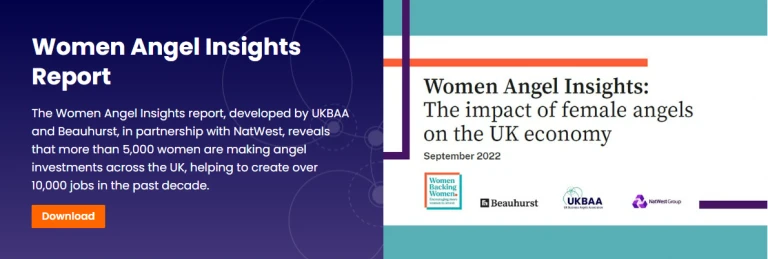Finding a business angel: five steps
HOME / / Finding a business angel: five steps
Private investors - more fetchingly dubbed 'business angels' - account for £800m to £1bn of early-stage investment each year.
Dragons' Den might have raised public consciousness of angels, but they remain elusive. So how do you go about finding one?
Before we dive in to the five steps, let's quickly recap what an angel investor is.
We like the definition provided by the British Business Bank, who provide Start Up Loans and second loans for companies like yours.
An angel investor is someone who invests their own money in a small business in exchange for a minority stake (usually between 10% and 25%).
Angel investors tend to be entrepreneurs or people with extensive experience in the business world.
Angel investors take a hands-on approach and may offer mentoring and support. Businesses that receive investment will generally benefit from the investor’s time, skills, contacts and business knowledge.
To sum up: there's a lot more than just money on offer. An angel investor is likely to spend lots of time with you to push your business forward.
Sound good? OK, onto how to find one...
1. Scrutinise other deals
Don't start your search looking for any investor, begin by looking for the perfect angel. You need to know who invests in companies just like yours and has the expertise you're looking for. So start by looking at businesses like yours.

Search private equity websites, trade mags, financial papers, and competitors' sites to discover where investment and stage of growth is coming from in your sector.
Take note of investors you want to explore further and founders/MDs of companies to contact - their insights will be invaluable.
2. Network
Investors are constantly looking for the next big thing, the start-up creating a buzz, right? Be where they're looking.
Get to the events your target angels attend and where you know other investment-ready companies or investor-connected MDs hang out.
Ask for attendee lists in advance so you know who to speak with. Avoid hard-sell tactics, but talk passionately about your business and who you're looking to meet. Angels don't back ideas, they back people. Relax and be yourself. Always follow up the next day via email or social media.
Team Transmit enjoyed a session with Jeni Smith from NetKno where we practiced our elevator pitches and got comfortable having business conversations.
Jeni was been named by the Telegraph and Natwest Business as one of their 100 Women to Watch!
For tips and videos, follow NetKno on Twitter.

3. Angel networks
The British Business Angel Association (BBAA) might sound stuffy but you'll soon realise angels don't fly solo.
They know each other, they talk and typically they'll share investments to minimise risk. Angels often make local investments and the BBAA will immediately refer you to your regional chapter. All BBAA associations and investors adhere to a code of conduct.
Another option is UK Business Angels Association (UKBAA) which has a section on its website specifically for entrepreneurs. Here you can find guides and resources to help you on your funding journey.
There are many other registered business angel networks and early-stage VC funds. Regional networks' fees and ways of operating vary. Usually they'll vet a business plan for a cost and present it to their registered angels. They then take a commission (around 5%) on any completed deals.
Angels Den is proving an exciting alternative. It's an online pitching and matching service which now boasts in excess of registered 2,500 angels. It charges £499 to get your idea in front of one of its angels and takes 5% of any deal secured. It claims a fifth of the people using its service have found backers.
Angels Den was formed out of the frustration of its founder Bill Morrow: his inability to secure funding for a previous idea despite having spent £15,000 joining other networks. (See step five for advice on matchmakers that can't demonstrate previous success and, more pertinently, guarantees on exactly who and how many people they're pitching you to.)

4. Attend events
Not all investor-entrepreneur matches are made online. Events focused on matching investment-seekers with investors are another great option, particularly if you've done some networking practice and have your elevator pitch nailed!
While each event has its niche, they essentially work around the established Open Coffee model of paying a fee upfront - typically £350-500 - to pitch your idea to a crowd of potential investors.
Some are better than others and our advice would be to find out as much as you can about the calibre and backgrounds of the attending investors before shelling out. Also look for events focused on your sector.
AngelsDen runs Speed Funding events and charges £249 per person for pitches to between 10 and 20 angels. You'd also pay them 5% of any funds raised.
5. Avoid middle men
Networking hard for an investor will guarantee you one thing: at least one person will offer to find investment for you for a bounty.
It's usually a slice or a one-off fee, or sometimes both. They're sharks. Be warned: it can be 5% for an intro to an angel network, who'll also want 5%, or 10% for completing a deal on their own. Add in legal fees and suddenly the money you get your hands on looks a lot more expensive than when you started out.
Make sure you're not paying for contacts you could make yourself with a bit of digging around.
And talking of men, let's talk about women too...
The Women Angel Insights: The impact of female angels on the UK economy report is a vital piece of research that demonstrates the huge contribution that female angel investors are making across the UK to building successful entrepreneurs in our economy.
Women are underrepresented in many sectors, and finance is one of them. So if your ambitions for your small business include embracing diversity, championing inclusion and fighting for gender equality, you could seek out a non-male investor.

If you found this guide to finding investors helpful, you can benefit from further business advice when you download our free ebook.


"We’re delighted to be the 2000th loan recipients!"
